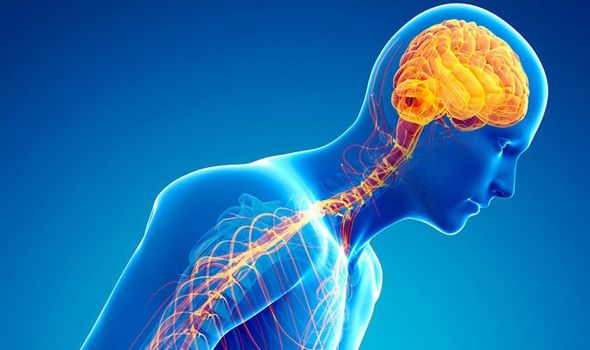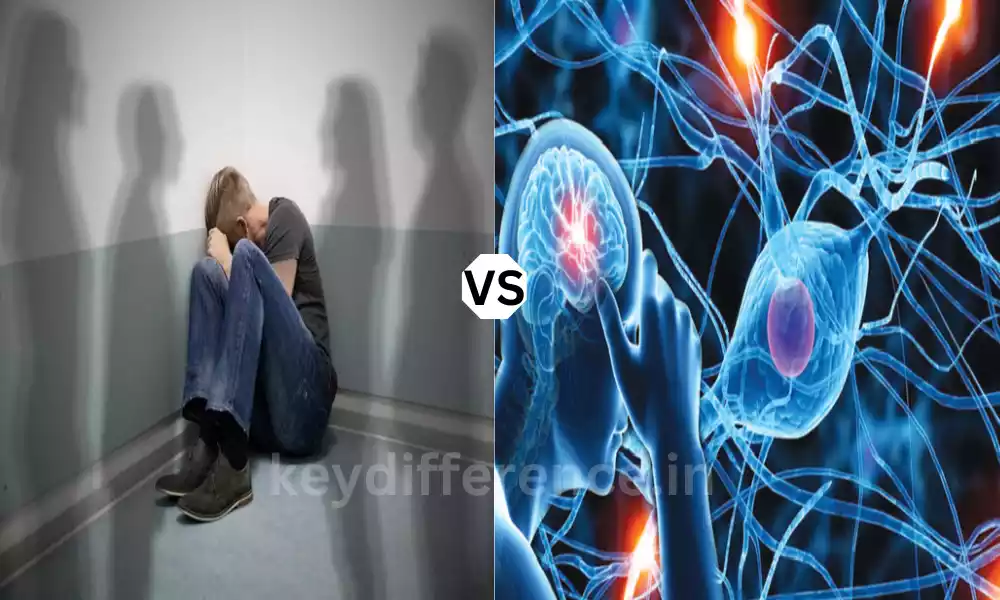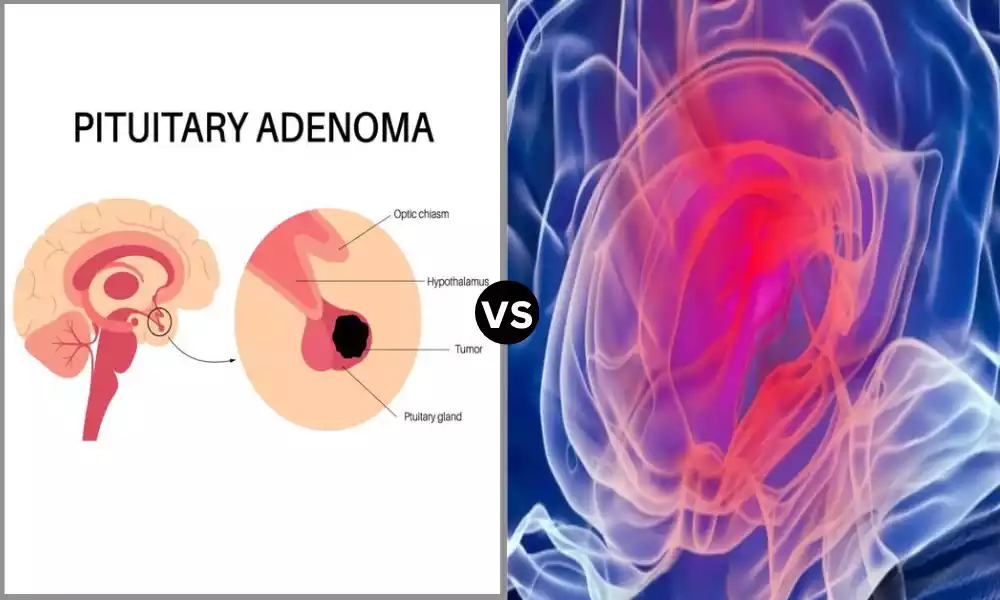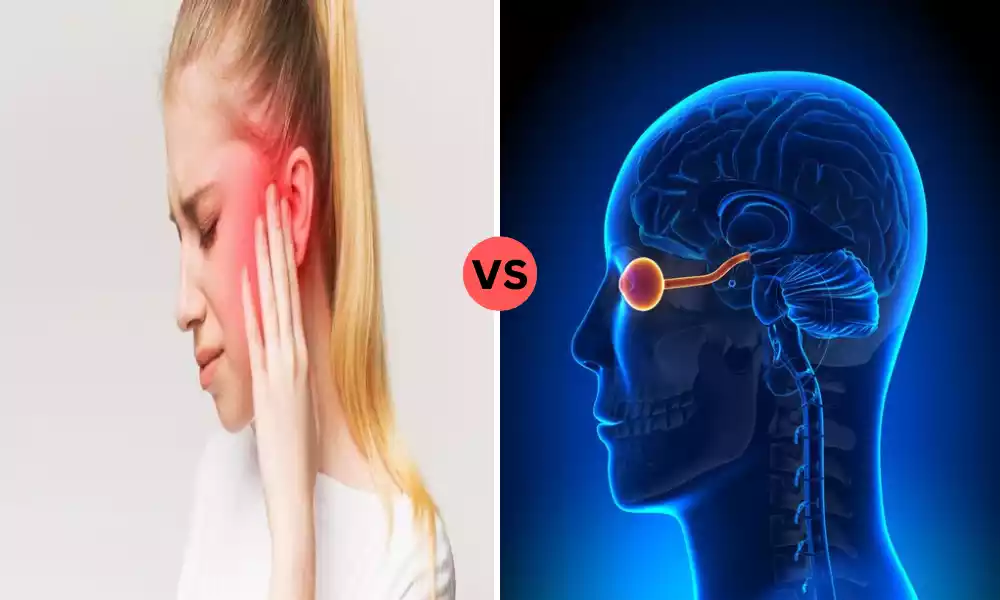Mental Illness and Neurological Disorder are distinct, yet interconnected aspects of human health. Although they may display multiple symptoms, knowing the basic differences between them is essential for successful diagnosis and treatment.
The distinct nature, causes as well as diagnostic strategies, and treatment strategies for neurological and mental disorders will emphasize the importance of precise differentiation for the well-being of people suffering from these ailments.
What is Mental Illness?
Mental illness, commonly known as mental health disorder or psychiatric disorders is a broad term that covers many conditions that impact the individual’s mental, emotional, and psychological health.

These disorders are characterised by disruptions in thought and emotions, behaviors, or a combination thereof which can hinder a person’s ability be able to function, communicate with other people, and deal with the stresses of daily life.
Mental illness can differ widely in the extent duration, duration, and signs, and may include disorders like anxiety disorders, depression schizophrenia, bipolar disorder, and many more.
The diagnosis of these conditions is usually by a set of criteria that are outlined in manuals such as the Diagnostic and Statistical Manual of Mental Disorders (DSM-5), which aids mental health professionals in evaluating and categorizing various mental health issues.
The treatment for mental illnesses typically includes a combination of therapy, medication lifestyle changes, medication, and support systems that help treat and ease symptoms.
What is Neurological Disorder?
An illness of the nervous system, also referred to as a neurological disorder or disease can be a general term to refer to a variety of diseases that predominantly have an impact on the nervous system that comprises the spinal cord, the brain as well as peripheral nerves.

These conditions can arise from many causes, including diseases, genetic causes and autoimmune reactions trauma, degenerative processes. They can cause disruptions in the structure or functioning of the brain and nervous system.
Neurological disorders cover a broad spectrum of illnesses that include epilepsy, Parkinson’s and Alzheimer’s diseases or multiple sclerosis, stroke as well as many more that have distinct characteristics and signs.
These conditions may be manifested as cognitive or physical impairments that affect the control of motor functions as well as memory, sensation, and other functions of the brain.
The treatment and diagnosis of neurological disorders typically need the assistance of neurologists. It can involve medical evaluations imaging studies, medications treatment rehabilitation, as well as surgical procedures, based on the particular condition and the root cause.
Importance of distinguishing between Illness and Neurological
The distinction between neurological and mental disorders is crucial due to a variety of reasons:
- Affordable Treatment: Every category of illness requires a different treatment approach. Mental illness is typically treated with counseling, psychotherapy, and, in some instances medications that target the brain’s chemical system. The most common neurologic disorders require surgical intervention, medical treatment, or rehabilitation to correct functional or structural issues within the brain’s nervous system. A precise diagnosis will ensure that patients receive the best treatment, enhancing their chance of healing and managing symptoms.
- Prevention of Misdiagnosis: Misdiagnosis can cause inappropriate treatments that are unproductive or even harmful. For instance, prescribing antidepressants to treat an illness that is neurological can cause negative effects, whereas ignoring the treatment of a mental illness can cause psychological and emotional stress.
- Reduced stigma: A precise diagnosis can help reduce stigma around mental illness. It helps ensure that people suffering from neurological conditions aren’t incorrectly classified as having mental illnesses, thus stopping the misinterpretation and discrimination that is often caused by mental health disorders.
- A greater understanding of the condition: Distinguishing between the two types of classifications helps to gain a better understanding of the nature of the disease the causes, symptoms, and the prognosis. This understanding will help health professionals, caregivers, and patients affected to make informed decisions regarding their treatment as well as treatment strategies.
- Research as well as Advancements: Accurate categorization of disorders can facilitate specific research and advances in the treatment and treatment. Researchers are able to develop treatments that are specific to the reasons for the disorder, which ultimately improves the outcomes of those suffering from the conditions.
- Resource Allocation: Resources for healthcare, which include professionals, funding, and facilities, can be efficiently allocated when the conditions are identified correctly and classified. This helps ensure that patients receive the proper degree of care and support.
- Care coordination: An accurate diagnosis will allow for more efficient coordination of care between health professionals. It assists in avoiding conflicts in treatment guidelines and ensures that patients receive a comprehensive, integrated treatment for both neurological and mental conditions.
- Patient Empowerment: Knowing the causes of one’s disease is empowering both the patient and their family members. It allows them to make informed decisions regarding their health, treatment options, and lifestyle adjustments that are necessary for managing their specific illness.
It is clear that the distinction between neurological and mental conditions is crucial to providing specific and efficient care to avoid misdiagnosis, decreasing stigma, and improving treatments and research options in both areas. This ultimately results in more positive outcomes for people who deal with these complexities of health.
Comparison Table of Mental Illness and Neurological
Here’s a comparison table outlining the key differences between mental illness and neurological disorders:
| Aspect | Mental Illness | Neurological Disorder |
|---|---|---|
| Affected System | Primarily affects the mind and emotions. | Primarily affects the nervous system, including the brain, spinal cord, and peripheral nerves. |
| Nature of Symptoms | Disturbances in thoughts, emotions, and behaviors. | Physical and cognitive symptoms, including motor control, sensation, and memory. |
| Causes | Often linked to psychosocial factors, genetics, and brain chemistry. | Typically associated with structural or functional abnormalities in the nervous system, genetics, infections, and trauma. |
| Common Conditions | Anxiety disorders, depression, bipolar disorder, schizophrenia, etc. | Alzheimer’s disease, Parkinson’s disease, epilepsy, multiple sclerosis, etc. |
| Diagnosis | Based on clinical evaluation, psychological assessments, and DSM-5 criteria. | Requires medical and neurological examinations, often with imaging and diagnostic tests. |
| Treatment Approaches | Psychotherapy, counseling, and medication for mental illnesses. | Medication, surgery, rehabilitation, or other medical interventions for neurological disorders. |
| Overlapping Conditions | Conditions with both mental and neurological symptoms, such as some types of dementia. | Conditions that can lead to both mental and physical symptoms, like multiple sclerosis or brain tumors. |
| Prevalence | Common worldwide, with millions affected. | Varied prevalence depends on the specific disorder; some are more rare than others. |
| Stigma and Misconceptions | Often associated with stigma, misunderstanding, and discrimination. | May be perceived as physical illnesses, but with their unique set of challenges and misconceptions. |
| Caregivers and Healthcare Providers | Mental health professionals, psychologists, counselors. | Neurologists, medical doctors, surgeons, and rehabilitation specialists. |
| Resources | Require resources like counseling centers and mental health services. | Require specialized healthcare facilities, imaging equipment, and neurology clinics. |
This table provides a concise overview of the main differences between mental illness and neurological disorders in terms of affected systems, symptoms, causes, diagnosis, treatment, and other relevant factors.
Understanding Neurological Disorders
Understanding the causes of neurological disorders is crucial to understanding the variety of diseases related to the nervous system which includes the spinal cord, brain, and peripheral nerves.
These conditions can arise from many causes, including diseases, genetic causes autoimmune reactions or trauma, as well as degenerative processes.
To understand more about the cause these key elements:
- Types of Neurological Disorders:
- Neurodegenerative disorders: These diseases result from the degeneration that progresses of nerve cells and can lead to diseases such as Parkinson’s and Alzheimer’s diseases and amyotrophic lateral degeneration (ALS).
- Epilepsy: Epilepsy is characterized by frequent seizures and may have a myriad of underlying causes.
- Stroke: Stroke is a condition that occurs when blood flow to brain cells is disrupted which causes brain damage.
- MS: The auto-immune disorder is a condition that affects central nerves, which can cause many symptoms.
- Brain Tumors: Anomaly-shaped growth in the brain may cause neurological signs.
- Causes and Risk Factors:
- Genetic Factors: Certain neurological diseases are genetic which means they could be passed down through the generations.
- Infections: Infections such as meningitis or encephalitis may affect the nervous system.
- Trauma: Head trauma or spine injuries could result in neurological issues.
- Autoimmune Reactions: Conditions such as multiple sclerosis affect the immune system attacking the nervous system.
- Aging-related Degenerative Processes: Aging may cause neurodegenerative diseases like Alzheimer’s.
- Symptoms:
- Neurological disorders may manifest as various symptoms, such as muscle weakness, cognitive impairment, and tremors, changes in sensory, or changes in the state of consciousness.
- The symptoms that are specific to each case depend on the nature and location of the disorder within the brain.
- Diagnosis:
- Diagnostic procedures typically involve neurologic and medical examinations that may involve imaging studies such as MRI as well as CT scans.
- Tests for blood or spinal taps as well as other diagnostic procedures could be needed to determine the cause of the disorder.
- Treatment:
- Treatment is different based on the particular condition and the underlying reason.
- The use of medication is not uncommon however, in certain instances, it is possible that surgery or rehabilitation be required.
- Lifestyle changes and supportive care can play an important role in addressing neurological disorders.
- Challenges and Impacts:
- Neurologic disorders can be a challenge for patients and their family members due to the unpredictability and progressive nature of these disorders.
- They could result in cognitive and physical impairments, which can affect daily life and the ability to live independently.
- Ongoing Research and Advancements:
- The field of neurology is constantly moving forward, as are efforts to identify the causes and find more efficient treatments for neurological conditions.
- The Role of Neurologists:
- Neurologists are medical professionals who specialize in the diagnosis and treatment of neurological diseases. They play an important part in the treatment of people suffering from these ailments.
Understanding the nature of neurological disorders is crucial for those suffering from these disorders, their caregivers as well as healthcare professionals. This helps in more effective management, better living conditions, and improvements in research and treatment that aim to reduce suffering from these challenging conditions on the community.
Structural and functional abnormalities in the nervous system
Functional and structural abnormalities within the nervous system could result in many neurological diseases. Knowing the causes of these disorders is crucial to diagnose and treat such ailments.
Here’s a look at some typical structural and functional issues within the nervous system:
Structural Abnormalities:
- Brain Tumors: Growths that are abnormal in the brain may cause malign or benign symptoms. They can interfere with normal brain function by compression of nearby structures, or affecting the flow of cerebrospinal liquid.
- Cerebral Vascular Anomalies: Conditions like cerebral aneurysms and arteriovenous malformations (AVMs) can lead to structural problems within blood vessels which can lead to the possibility of bleeding within the cerebral area (hemorrhagic stroke) or inadequate blood flow (ischemic stroke).
- Head trauma: Traumas to the skull or head may cause damage to the spinal cord or brain and may lead to permanent neurological problems.
- Spinal Cord Lesion: Spinal cord injuries or disorders may result from injuries, infections or degenerative diseases, that can lead to sensory and motor impairments that are not as severe as the injury.
- Neurodevelopmental Disorders: Conditions such as neural tube deformities (e.g. spina bifida) result from the insufficient closing of the nerve tube in fetal development which can cause structural problems in the brain and spinal cord.
Functional Abnormalities:
- Neurotransmitter Imbalances: Insufficiency of the release or reuptake or the reception of neurotransmitters inside the brain could lead to conditions like anxiety, depression or schizophrenia.
- electrical abnormalities: The epilepsy condition is caused by an abnormality in electrical function of the brain, that can trigger seizures.
- Degeneration and Atrophy: Conditions like Alzheimer’s disease as well as other neurodegenerative diseases cause the gradual loss of brain and neuron tissue, which can lead to motor and cognitive impairments.
- Autoimmune disorders: Multiple sclerosis-related conditions result from the immune system in error, inflicting damage to the myelin membrane which is a nerve-sealing membrane, causing disruption to nerve conduction.
- Metabolic Disorders: Genetic metabolic disorders such as Tay-Sachs’s disease or phenylketonuria (PKU) may result in excessive accumulations of poisonous substances within our nervous system which can cause functional impairments.
- Neuromuscular junction disorders: Disorders like myasthenia gravis can affect the way nerves communicate with muscles, causing weakness and fatigue.
- Motor Neuron Disorders: Disorders such as amyotrophic lateral (ALS) (ALS) are caused by the loss of motor neurons, which can cause weakness of muscles and paralysis.
The identification of these functional and structural problems is vital for diagnosing and the creation of suitable treatment strategies. Treatment can involve medications or physical therapy, surgery or other treatments to control symptoms, stop progression, or reduce the reason for the abnormality.
Neurologists and other specialists in healthcare are essential in diagnosing and addressing these diseases.
Medical and neurological examinations
Neurological and medical examinations are essential to the diagnosis process for people who are suspected of having neurological issues. These tests help medical professionals evaluate the general health of a patient identify the specific neurological problems and determine the best course of treatment.
Here’s a quick overview of what these tests entail:
Medical Examination:
- Patient Histories: The medical examination usually begins with a thorough patient’s history. The healthcare professional will ask the patient questions about his medical history, current symptoms as well as family history, lifestyle issues, and previous diagnosis or treatment.
- Physical Exam: A thorough physical examination is conducted to determine the general health of the patient and to identify any physical anomalies. It could include measures of blood pressure and heart rate, temperature, and a thorough review of the general appearance.
- Neurological Exam: While this is an element of the medical examination it is focused on the neurological system. The neurologist or doctor evaluates neurological function by examining:
- Reflexes: Testing reflexes with a hammer for reflexes to determine the health of our nervous system.
- Strength of muscles: Assessing the strength of muscles and coordination.
- Sensory function: assessing the sensory perception of the sensation of pain, touch, and even vibration.
- Cranial nerves: Testing the role of the twelve cranial nerves that control motor and sensory functions of the neck and head.
- Balance: evaluating the balance and coordination that may affect neurological diseases.
- Evaluation of Mental State and Cognitive Function: If mental or cognitive health issues are evident, a brief evaluation of the mental and cognitive health status can be performed.
- Examen of Diagnostic Tests: The healthcare doctor may review any pertinent scans or diagnostic studies like MRI scans CT scans and blood tests, which are conducted prior to undergoing the examination.
Neurological Examination:
- Complete Neurological History: Alongside the general medical background, the neurological examination requires a deeper investigation into the specific symptoms that affect neurological disorders, including headaches and changes in sensation, muscle weakness, and many more.
- Exam of the Cranial Nerves: An in-depth examination of every cranial nerve done, evaluating eye movements, visual acuity sense of strength in the face, and hearing as well as other functions related to these nerves.
- Motor Function Exam: This involves testing the strength, tone, and coordination of various body parts and also evaluating the reflexes.
- Sensory Exam: Healthcare providers assess sensorial perception, including the ability to sense the sensation of touch, pain, temperature as well as vibration.
- Balance and Coordination Assessment: The assessment of balance and coordination can help determine if there are any issues that might signal specific neurological issues.
- Gait Examen: Evaluating how the patient moves and walks could identify issues with motor control as well as coordination.
- Additional Diagnostic Tests: If necessary, the healthcare provider may order further diagnostic tests, such as EEG (electroencephalogram), EMG (electromyography), or lumbar puncture to provide more detailed information about the patient’s neurological condition.
Neurological and medical exams are vital to diagnose and understand neurological conditions. They assist healthcare professionals to identify the root cause of the problem and formulate suitable treatment plans that are tailored to the needs of the patient.
These tests are usually performed by neurologists or other health specialists who are experts in the nervous system.
Mental illness primarily affects thoughts and emotions
Mental illness is primarily a problem with thoughts and emotions and has a major effect on one’s mental and psychological health.
Let’s take a closer analysis of the ways that mental illness can affect the way you think and feel:
- Emotional Disturbances:
- People suffering from mental illness typically suffer from persistent and intense mental disturbances. For instance, depression could cause a sense of despair and a feeling of despair as well as anxiety disorders that create excessive anxiety and worry.
- Mood Swings:
- Certain mental disorders, like bipolar disorder, are marked by extreme mood swings. People can experience alternating periods of depression as well as hypomanic or manic episodes that can cause significant changes in mood and behavior.
- Anxiety and Fear:
- Anxiety disorders, including an anxiety disorder called generalized or panic, can lead to excessive fear, worry, and increased emotions, which are often accompanied by physical symptoms such as a heart rate increase or sweating.
- Irrational Thoughts:
- Mental illness can cause the development of distorted or unreasonable thoughts. Obsessive-compulsive disorders (OCD) may cause uncontrollable, negative thoughts or obsessions that can cause extreme distress.
- Psychosis:
- Certain mental illnesses such as schizophrenia may cause psychosis. It is characterized by a loss of connection to reality, and people experiencing hallucinations, delusions, and disturbed thought processes.
- Distorted Perceptions:
- Mental illness can alter how people perceive themselves, others as well as the outside world. Disorders like body dysmorphic can result in distortions in self-perception. Likewise, eating disorders can alter the perception of the body.
- Cognitive Impairments:
- Cognitive symptoms are prevalent in a variety of mental disorders. The impairments can affect memory, concentration, and capacity to handle information, which can lead to cognitive problems that can affect the way we think and make decisions.
- Negative Self-Perception:
- The most common symptom of mental illness is low self-esteem and negative self-image. Disorders like depression can cause people to feel low about themselves and to engage in self-criticism.
- Suicidal Thoughts:
- In the most severe instances, mental illness may cause suicidal thinking or even thoughts of suicide which is a serious problem that needs immediate intervention and attention.
It is important to remember that mental illnesses differ widely in the specific signs and symptoms they exhibit, as well as how they impact the way we think and feel. A precise diagnosis, treatment, and care are vital for people suffering from mental health problems.
The most common treatment methods include psychotherapy and medication, lifestyle modifications, and support systems that are designed to manage and ease the cognitive and emotional disturbances.
Neurological disorders primarily affect physical and cognitive functions
The most common neurological disorders affect cognitive and physical functions and the exact manifestations and effects can vary significantly based on the type of disorder.
Here’s a more detailed analysis of how neurological diseases can impact cognitive and physical functions:
Physical Function:
- Motor Control: Numerous neurological conditions can affect motor control, resulting in symptoms such as muscle weakness, tremors, and diminished coordination. Disorders like Multiple sclerosis and Parkinson’s disease can cause severe physical limitations.
- Sensory Perception: Neurological disorders can alter sensorimotor functions, leading to changes in the capacity to perceive or hear, taste smell, or even touch. For instance, disorders such as optic neuritis may alter vision.
- Gait and Balance: Nerve disorders system can cause problems with gait and balance, leading to issues walking and keeping stability. It can be caused by disorders such as ataxia.
- Seizures: It is the result of recurrent seizures. These are abrupt, uncontrolled electrical disruptions in the brain. They can cause physical convulsions, loss of consciousness, or even injury.
- Speech and swallowing: Neurological conditions can affect the muscles and nerves that are involved in swallowing and speaking. Dysphagia-related conditions can result in difficulties swallowing, whereas dysarthria could impact speech.
- The word “pain” refers to; A few neurological diseases like migraines or neuropathic pain, which can cause persistent or intense pain that can affect a person’s physical health and overall well-being.
Cognitive Function:
- Memory Impairments: Neurological diseases such as Alzheimer’s disease, as well as other forms of dementia, can cause cognitive problems, mainly in memory.
- Executive Function: Executive functions such as decision-making, planning, and problem-solving are affected by various neurological disorders that affect an individual’s capacity to perform everyday tasks.
- Attention and Concentration: Conditions such as Attention disorder of hyperactivity (ADHD) can cause issues with maintaining concentration and focus.
- Communications and Language: Aphasia is a disorder of language that can be a result of neurological issues like strokes or traumatic brain injury, which can affect the ability of an individual to communicate effectively.
- Memory Processing Rate: Neurological disorders can cause a decrease in processing speeds in the brain, making it difficult for people to process information swiftly and effectively.
- Cognitive flexibility: Some conditions, like some forms of autism, or obsessive-compulsive disorder (OCD) can affect cognitive flexibility as well as the capacity to adjust to changes in the environment.
It’s crucial to know that neurological disorders cover many different conditions and each has its own range of symptoms and effects. A precise diagnosis and appropriate treatment by health experts, like neurologists, is essential for controlling these physical and mental issues.
Treatment can include medication as well as occupational therapy, physical therapy, rehabilitation for cognitive impairment, and other treatments to meet the particular needs of people who suffer from neurological disorders.
Conclusion
Neurological disorders and mental illness are distinct health issues, each with specific characteristics and consequences. Although there are some commonalities like their complicated causes and possible psychosocial effects being able to distinguish between these two conditions is vital to ensure successful diagnostics and treatments.
The treatment of people suffering from these conditions requires a broader approach as well as a knowledge of the specifics of the disorder, which allows to provide more specific and caring treatment.







